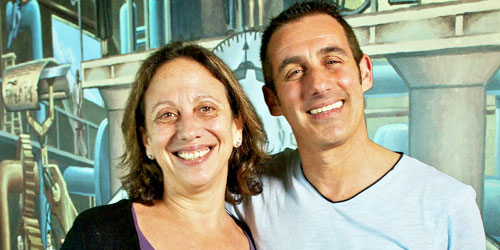By Tara Cavanaugh and Ruchi Naresh

The American Civil Liberties Union has long been an advocate for LGBT equality. Michigan's ACLU chapter has a special tool in its belt for fighting for LGBT rights: the LGBT Project.
Since 2001, the project has defended gay men from police entrapment and unfair imprisonment, fought for same-sex couples' rights to benefits, lobbied for LGBT protections at the state capitol and plenty more.
The project is driven almost entirely by Jay Kaplan. He's won a few important battles, but there's still a war against LGBTs in our state – a war which Kaplan has learned a variety of ways to fight.
Taking the sting out of sting operations
Police raids, gay targeting and unfair imprisonment aren't just the black-and-white snapshots of LGBT history in the last century. Those problems are alive in this century, too.
In a 2001 Rouge River sting operation, undercover Detroit police officers posed as gay men, hoping to arrest and charge people for violating an "annoying person's ordinance." Roughly 1,000 men were arrested. Many had their vehicles impounded and were slapped with a $1,000 fine.
When Kaplan joined the project in 2001, this became his first case.
In attempt to appear gay, young cops in short shorts smiled and waved at park visitors, Kaplan explains. "They were trying to get people to do things that could be considered annoying so they could arrest them," Kaplan says.
"(The ordinance) would prohibit things that are protected speech under the constitution. It's not illegal to wave at somebody; it's not illegal to smile. Can you imagine people getting arrested for things like that? It's ridiculous."
Kaplan sued on the behalf of seven plaintiffs in federal court, challenging the constitutionality of the ordinance. It wasn't easy to find arrestees who were willing to come forward, but the Triangle Foundation (now Equality Michigan) helped find people.
What was the outcome of the suit? For starters, the seven plaintiffs settled out of court for a large cash sum. And the annoying person's ordinance "is off the books," Kaplan says.
More than a legal war
Sometimes legal battles aren't best fought in courtroom arguments. They also need to be fought with education.
Kaplan took this softer approach when he worked with the Michigan Department of Corrections to stop marking gay inmates as "active homosexuals" on all of their records. Inmates who entered the system after 2006 no longer have such a marker.
How did Kaplan do it?
"Letters. Talking. Explaining that there's no reason for this, and the significance here," Kaplan says. He worked with administrators in the department, helping them understand that labeling an inmate as homosexual only exacerbates the homophobia that often exists in correctional facilities.
"We're limited on what we can litigate in our state," Kaplan says. "We have an incredibly conservative appellate court system in Michigan, which in the past has issued a number of decisions very damaging to the cause of LGBT civil rights and hostile towards civil rights in general. You don't want to file something that's just going to create worse law. So a lot of times what you do need to do is education. Hopefully some persuasion."
So sometimes you have to get people on your side, not just fight them on issues?
"Exactly," Kaplan says. "Sometimes you just can't win with our courts. Especially for the last decade. It was very, very difficult. Just a dead end. You had some very ideologically-driven justices on the court who had some very strong opinions on some of these issues."
Win some, lose some
Kaplan encountered some of those very strong opinions a few years ago.
In 2008, Kaplan was fighting a battle that began in 2004, when Michigan citizens approved Proposal 2, which added an amendment to the state constitution that prohibits same-sex marriage and civil unions.
"Once it became part of the constitution, some started saying cities couldn't offer domestic partner health insurance benefits," Kaplan says. "And then the attorney general, Mike Cox, issued an opinion saying he thought Kalamazoo offering domestic partner health benefits was unconstitutional." The ACLU filed a lawsuit, requesting a declaratory judgment and arguing that the benefit is merely an employee benefit – not a benefit that's only legally deserved by married couples.
Despite an early success at the trial court level, the case made its way up to the Michigan Supreme Court, which ruled against the ACLU. It said that the amendment means no public institution can offer any form of same-sex relationship recognition, including offering health benefits.
Since then, Kaplan has helped public institutions, such as universities, change their eligibility requirements to offer a "plus-one" option in their benefits packages. This means that an employee can allow another person of his or her choosing to share a health plan.
What you don't know…
Kaplan also spends a lot of time fighting for rights that many LGBTs don't even know they don't have.
For all that he's fought for, Kaplan's pet project is Michigan's restrictions against same-sex couples adopting children.
Kaplan has a warm, friendly, even teacherly voice. But when he starts talking about adoption, his tone begins to stretch in outrage.
"We have one of the broadest restrictions in the country," he says – broad restrictions that aren't even officially on the books.
The culprit? Proposal 2, again, which bans same-sex marriage. Judges who grant adoptions have also interpreted it to mean that same-sex couples can't adopt children together.
This means only one parent signs the adoption papers, and "your children don't have the legal protection of two parents," Kaplan says. It also means "children might not be able to access the health insurance of (the non-legally recognized) parent."
This unofficial, but widely practiced restriction on same-sex parent adoption also makes for messy custody battles if the couple breaks up, Kaplan says. The "unofficial" parent loses all rights to see the children he or she raised.
Overall, Kaplan says, "it undermines the stability of families."
Making a map
"When you look at the polling that has been done, most Michiganders favor civil rights protections for LGBT people, they believe there should be forms of relationship recognition," Kaplan says. "But when we look at our policies, when we look at our practices, we're out of sync."
Not only are LGBTs not allowed marriage or adoption in Michigan, but they're also not protected from discrimination in housing or employment – even though nearly every other minority class imaginable is.
This means that Kaplan and his team have plenty of work to do.
"I think we owe a duty, and by we I mean LGBT organizations and programs, to set forth a road map: How are we going to get there, what's it going to take, what needs to happen. I think people have to have a clear understanding of what it all involves. It's not just a magic wand, filing a lawsuit or passing a law. It's kind of a holistic approach."










